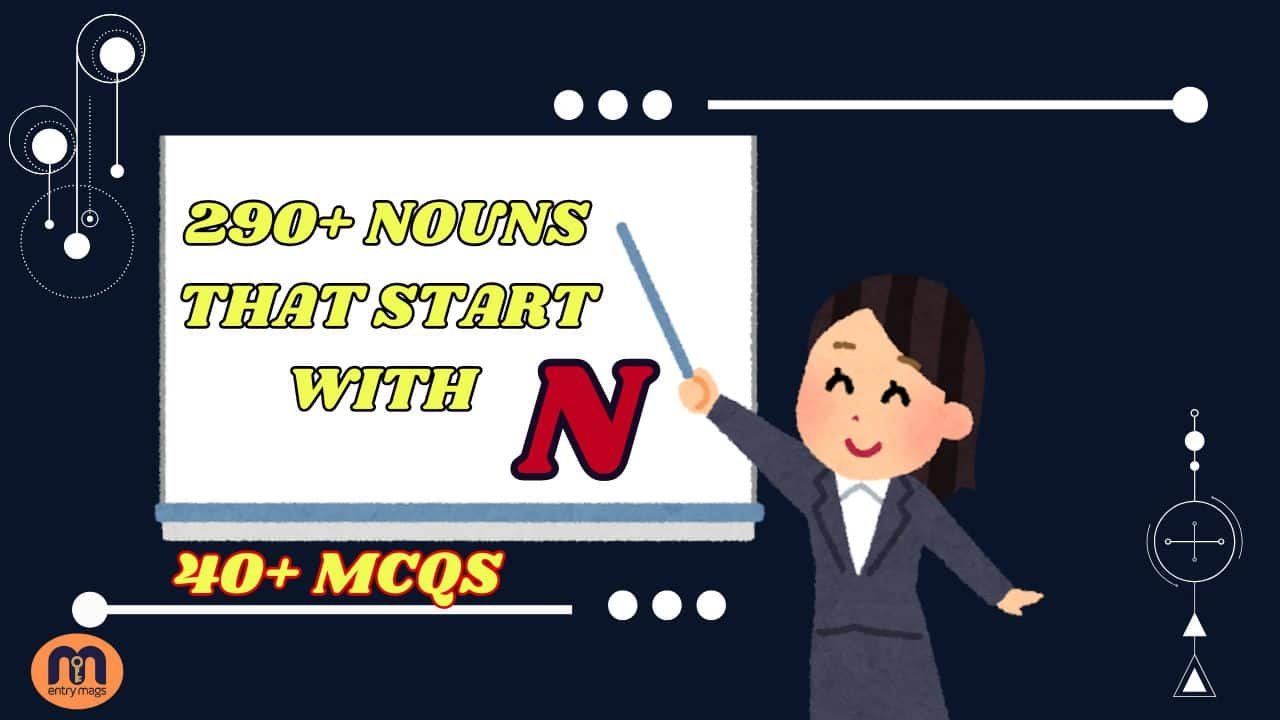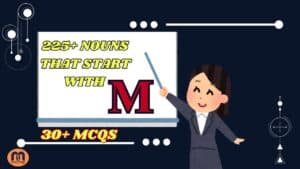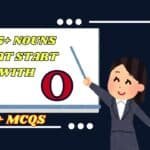Nouns That Start With N: The world of words is vast, and every letter of the alphabet holds a treasure trove of possibilities.
While many people are familiar with nouns starting with A, B, and C, fewer stop to appreciate the richness and variety that comes with the letter “N.”
In fact, nouns beginning with N can add a unique touch to conversations, writings, or any form of expression.
Whether you’re a writer looking to enhance your work, a student wanting to expand your vocabulary, or simply someone curious about language, this list of 290+ nouns that start with “N” is sure to provide you with a wealth of options.
Why Focus on Nouns?
Nouns are the building blocks of sentences they name people, places, things, or ideas. Understanding and using a variety of nouns can help you communicate more clearly, make your writing more dynamic, and even improve your memory and retention of information.
The letter “N” offers a surprising number of nouns, each with its own unique flavor and potential applications. Let’s dive into some of the most useful and interesting nouns that start with N.
Types of Nouns That Start with N
Nouns starting with N span across many different categories. From abstract concepts to tangible objects, here’s an exploration of how these nouns fit into our everyday lives.
People and Roles
- Nanny: A caregiver or guardian, often used to describe a person employed to take care of children.
- Noble: A member of the aristocracy, typically holding a high social rank.
- Nomad: A person who moves from place to place in search of food or work.
- Neighbor: Someone living near or next to you.
- Nurse: A healthcare professional who cares for the sick or injured.
- Novelist: A writer of novels.
Places
- Nation: A large group of people who share a common government, culture, or language.
- Neighborhood: A district or area within a town or city where people live.
- Nook: A small, cozy corner or alcove.
- Nirvana: A place of perfect peace and happiness, often associated with Buddhism.
- Nest: A structure or place built by birds, animals, or even humans for rest or habitation.
Objects and Things
- Notebook: A book for writing notes or keeping records.
- Necklace: An item of jewelry worn around the neck.
- Napkin: A piece of cloth or paper used to wipe the face or hands.
- Net: A fabric or material with a grid-like structure used for trapping or carrying items.
- Needle: A slender, pointed object used in sewing or medical procedures.
Concepts and Ideas
- Nostalgia: A sentimental longing for the past.
- Negotiation: A process of discussion aimed at reaching an agreement.
- Nurturing: The act of caring for and encouraging growth or development.
- Necessity: Something essential or needed.
- Nihilism: A philosophical belief that life is meaningless or without purpose.
Nature and Environment
- Nebula: A cloud of gas and dust in space, often a birthplace for stars.
- Nutrient: A substance that provides nourishment for growth and health.
- Nymph: A mythical spirit of nature, often depicted as a beautiful maiden living in trees, rivers, or mountains.
- Nightfall: The period of darkness after the sun sets.
- Nestling: A young bird that has not yet learned to fly.
Animals and Creatures
- Numbat: An Australian marsupial known for its long, sticky tongue used to catch termites.
- Narwhal: A type of whale with a long, spiral tusk extending from its forehead.
- Newt: A small amphibian that can regenerate its limbs.
- Nighthawk: A species of bird known for its nocturnal habits and aerial acrobatics.
- Nandu: A large flightless bird native to South America, also known as the rhea.
Food and Drinks
- Noodles: A type of pasta made from unleavened dough.
- Nectar: A sweet liquid produced by flowers that attracts pollinators.
- Nugget: A small lump of something, often used in reference to food such as a chicken nugget.
- Nutmeg: A spice made from the seed of a tropical plant.
- Nachos: A dish made from tortilla chips topped with melted cheese and other ingredients.
Nature and the Earth
- Nirvana: A state of perfect peace, free from suffering and desire, often associated with Buddhism.
- Nimbus: A luminous cloud or halo surrounding a supernatural being.
- Nadir: The lowest point, particularly in astronomy, referring to the point directly opposite the zenith.
- Nettle: A stinging plant, typically found in temperate regions.
- Nub: The essential or central point of something.
- Nest: A structure built by animals or birds to hold eggs or young.
- Neptune: The eighth planet in our solar system, known for its blue appearance.
- Nocturne: A musical composition inspired by or evocative of the night.
- Nook: A small, secluded corner or recess.
- Nightfall: The time when the sun sets and darkness begins.
- Nebula: A vast cloud of gas and dust in space, often where new stars are born.
- Nutmeg: A spice derived from the seed of a tropical tree.
- Nourishment: Food or nutrients necessary for growth and health.
- Nutrient: A substance that provides nourishment for plants or animals.
- Noxiousness: The quality of being harmful or poisonous.
- Nose: The part of the face that is used for breathing and smelling.
- Nymph: A mythical spirit of nature in Greek mythology.
- Nodule: A small, rounded lump, especially one found in geology or biology.
- Nasturtium: A plant with edible flowers, often used in salads.
- Nomad: A person who moves from place to place, typically in search of food or pasture.
- Needle: A sharp, slender tool used in sewing or medical procedures.
- Nuclear: Relating to the nucleus of an atom or nuclear energy.
- Nugget: A small chunk or lump of something, especially gold.
- Nymphoid: Relating to or resembling a nymph, typically in appearance.
- Naiad: A water nymph in Greek mythology, usually inhabiting lakes and rivers.
- Nectar: The sweet liquid produced by flowers that attracts pollinators.
- Nocturnal: Active or occurring during the night.
- Nutraceutical: A food or supplement believed to have medicinal properties.
- Nox: A term used for night in Latin, also associated with darkness or the night in mythology.
- Nerviness: The quality of being tense or anxious.
- Nightingale: A small songbird known for its powerful and beautiful song.
- Nomadism: The practice of living a nomadic lifestyle.
- Narcissus: A genus of flowers, often associated with beauty in Greek mythology.
Mystical and Mythological Creatures
- Nymph: A nature spirit from Greek mythology, typically depicted as a beautiful maiden.
- Nagual: A Mesoamerican concept where a person can transform into an animal or spirit.
- Naiad: A freshwater nymph from Greek mythology, associated with rivers and lakes.
- Nightmare: A frightening dream or a mythical creature that was believed to sit on a sleeper’s chest.
- Nereid: A sea nymph in Greek mythology, often depicted as a beautiful young woman.
- Nundu: A large, mythical creature from African folklore, often described as a terrifying predator.
- Necron: A mythical creature, often associated with death or decay in different cultures.
- Nagini: A serpent from mythologies, commonly appearing in Hindu mythology.
- Nocturnus: A mythical being, often associated with the night or the darkness of the world.
- Nephilim: Giants in biblical mythology, believed to be the offspring of angels and humans.
- Nubian Lion: A subspecies of lion native to the Nile region in Africa.
- Nuckelavee: A terrifying sea monster from Scottish folklore.
- Naiadism: The cult or practices associated with water nymphs.
- Nighthaunt: A type of ghostly creature in folklore or fantasy settings, often lurking at night.
- Nyx: In Greek mythology, the primordial goddess of the night.
- Noroi: A mythical Japanese creature or curse.
- Nyxian: A term used for creatures or spirits associated with the night.
- Neanderthal: A now-extinct species of human that lived in prehistoric times.
- Nymphology: The study of mythological water nymphs.
- Neptune’s Minions: Mythological creatures associated with the sea god Neptune.
- Necromancer: A wizard or sorcerer in folklore who can communicate with the dead.
- Noctua: An owl, particularly associated with wisdom and darkness in mythology.
- Nidhogg: A serpent-like creature from Norse mythology that gnaws at the roots of the World Tree.
- Naacal: A term used to describe a legendary or ancient race of humans in various myths.
- Nyarlathotep: A deity from H.P. Lovecraft’s Cthulhu Mythos, known as the Crawling Chaos.
- Nuckelavee: A terrifying, horse-like sea monster in Scottish folklore.
- Narwhal: A mythical creature represented as a sea monster with a large spiral tusk.
- Nymphomania: A term used historically to describe excessive sexual desire, often mythologically related to female nymphs.
- Navi: A term from “Avatar,” referring to the native alien species.
- Naga: A serpent-like being from Indian mythology, often depicted as a protector.
Art and Creativity
- Narrative: A story or account of events or experiences.
- Nouveau: Referring to “Art Nouveau,” a style of art characterized by flowing, organic lines.
- Naiveté: The quality of being innocent or unsophisticated.
- Niche: A specialized but valuable market or field.
- Novella: A short novel or long short story, often with a focused plot.
- Noun: A part of speech used to name things (people, places, ideas, etc.).
- Narrator: A person who tells the story in a book, movie, or play.
- Nail: In arts and crafts, a thin metal spike used for fastening or decorative purposes.
- Nightscapes: Works of art depicting scenes of the night, often with a dark or atmospheric theme.
- Neon: A type of bright, fluorescent lighting often used in signs and art.
- Notion: A general idea or belief, often vague or subjective.
- Nudism: The practice or philosophy of living without clothes.
- Nod: A gesture of the head to indicate agreement, acknowledgment, or sleep.
- Novelty: A new or unusual object, idea, or trend that appeals due to its uniqueness.
- Niche Art: Art that appeals to a specific, often small, group of people.
- Naturalism: A style of art or literature that depicts realistic representations of nature and life.
- Netting: A type of fabric made from intersecting threads, often used in art and construction.
- Nonconformity: The act of resisting societal norms, often expressed in creative work.
- Noise: Sound that is unwanted or disruptive, often incorporated creatively in sound art or music.
- Neorealism: An art movement focused on depicting ordinary, everyday life with a realistic and unidealized approach.
- Nap: A short sleep, sometimes associated with rest and rejuvenation.
- Nurturing: The act of fostering growth, development, or care, often used in creative and educational contexts.
- Nobel Prize: A prestigious international award given for significant achievements in various fields.
- Nexus: A connection or series of connections linking two or more things.
- Negation: The contradiction or denial of something in logic or philosophy.
- Non-fiction: A genre of writing based on factual events, people, or information.
- Narratology: The study of narrative structures in literature, film, and other mediums.
- Nuptials: A formal term for wedding ceremonies or marriage-related events.
- Nonchalance: The state of being relaxed and unconcerned, often associated with a cool, detached attitude.
- Nostalgia: A longing for the past, often experienced through memories or media.
- Narrative Arc: The structure of a story that includes the beginning, middle, and end.
- Nocturne: A musical composition that is inspired by or evokes the night.
- Neglect: The state of being ignored or disregarded, often with negative consequences.
- Nimbleness: The quality of being light, quick, and agile in movement.
Tech and Innovation Nouns
- Nanotechnology: The science of manipulating materials on an atomic or molecular scale.
- Neural Network: A system of algorithms modeled after the human brain, used in artificial intelligence.
- Node: A point where lines or pathways intersect, used in networking and data structures.
- Neutron: A subatomic particle found in the nucleus of atoms, with no charge.
- Nucleus: The central part of an atom, containing protons and neutrons.
- Nanosphere: A spherical particle made from nanomaterials, used in various scientific fields.
- Neodymium: A rare-earth metal often used in high-performance magnets.
- Network: A system of interconnected people or devices for communication or data sharing.
- Neurotransmitter: A chemical messenger that transmits signals across a synapse in the nervous system.
- Nanometer: A unit of measurement equal to one-billionth of a meter, often used in nanotechnology.
- Neutrino: A tiny subatomic particle with no electric charge, typically produced in nuclear reactions.
- Nanomaterials: Materials that have structures at the nanoscale, often exhibiting unique properties.
- Natural Language: A human language used for communication, such as English or Spanish.
- Nanorobots: Microscopic robots that can perform tasks on a molecular scale.
- Neurology: The branch of medicine dealing with the nervous system and its disorders.
- NLP (Natural Language Processing): A field of AI focused on enabling computers to understand human language.
- Nanotechnology: Technology that manipulates matter on a molecular or atomic scale to create new materials and devices.
- NoSQL: A type of database that doesn’t use traditional relational models, often used in big data.
- Neuralink: A neurotechnology company focused on developing implantable brain–machine interfaces.
- Network Security: Measures taken to protect the integrity and safety of a computer network.
- Neutron Star: The remnants of a massive star that has exploded in a supernova and collapsed under gravity.
- Nanosilver: Silver particles at the nanoscale, used in a variety of products for their antimicrobial properties.
- Nanotube: A cylindrical structure made of carbon atoms, used in materials science and electronics.
- Non-volatile Memory: Memory that retains its data even after power is turned off, such as flash storage.
- Nanoscience: The study of structures and materials on the scale of nanometers.
- Node.js: A runtime environment for executing JavaScript code outside of a browser, typically used for server-side applications.
- Nanoelectronics: The study and application of electronics on the nanometer scale, enabling smaller and more efficient devices.
Emotions and Psychological States
- Nostalgia: A sentimental longing or wistful affection for the past.
- Nervousness: The state of being anxious or uneasy, often before an event or challenge.
- Numbness: A physical or emotional state of not feeling anything.
- Neurosis: A mental disorder characterized by anxiety, irrational thoughts, or compulsive behaviors.
- Nervosity: The quality of being nervous or tense.
- Nihilism: The belief that life is meaningless and rejects traditional values.
- Numbness: A lack of feeling, both physically (e.g., due to cold or injury) or emotionally (e.g., in response to trauma).
- Neurosis: Psychological distress often manifesting in anxiety or obsessive behavior.
- Narcissism: Excessive self-love or self-centeredness, often with a lack of empathy for others.
- Nurturing: The act of providing care, attention, and support for growth or development.
- Nervousness: A heightened state of anxiety or worry.
- Naiveté: The state of being naïve or inexperienced, often leading to vulnerability.
- Nostalgia: A bittersweet longing for the past, often idealizing it.
- Numbness: The inability to feel emotions, which can sometimes be a protective psychological response.
- Neuroticism: A personality trait characterized by emotional instability and a tendency toward anxiety and worry.
- Narcissism: The excessive admiration of oneself and an inflated sense of self-importance.
- Nihilism: A rejection of established social norms, morals, and meaning in life.
- Nerve-racking: Something that causes extreme stress or anxiety.
- Negativity: The tendency to focus on the undesirable aspects of situations.
- Nervosity: A state of unease, often accompanied by physical signs like sweating or shaking.
- Nostalgic: A feeling or expression related to longing for the past.
- Nefariousness: The quality of being wicked, villainous, or morally corrupt.
- Neurochemistry: The study of chemicals and neurotransmitters that affect brain function and behavior.
- Noble Heart: A pure, good-natured, or generous emotional state or characteristic.
- Nurturing Instinct: A natural inclination to care for others, especially in a parental or protective sense.
Cultural and Historical Terms
- Nationalism: A sense of pride in one’s country, sometimes to the exclusion of other nations.
- Nobility: A class of people distinguished by high social rank or title.
- Neolithic: The later part of the Stone Age, marked by the development of agriculture.
- Noblesse: The status or class of the nobility in a society.
- Naturopathy: A system of alternative medicine focused on natural remedies and healing.
- Nostalgia: Longing for a past era, often romanticized or idealized.
- Nomadism: The lifestyle of people who move from place to place, usually in search of food or grazing land.
- Nationalism: The belief that one’s own country and culture are superior to others.
- Nihilism: A philosophical belief that life is without objective meaning, purpose, or value.
- Napoleonism: The style of leadership and military strategy associated with Napoleon Bonaparte.
- Nativism: The policy of protecting the interests of native-born inhabitants against immigrants.
- Nonconformity: The refusal to conform to established societal standards or norms.
- Nomenclature: A system of naming, especially in science or art.
- New World: A term used to describe the Americas during the time of European exploration.
- Neutrality: The policy of not taking sides in conflicts between other nations.
- Nautical: Relating to ships, navigation, or the sea.
- Nomadic: Describing a lifestyle characterized by moving from place to place.
- Nationalism: A political ideology that emphasizes the interests and culture of one’s own nation.
- Nurturance: The act of caring for and supporting the growth of someone or something.
- Nostalgic: A term for longing or reminiscing about the past, often in a romanticized way.
- New Age: A spiritual movement that emerged in the 1970s, blending various philosophies and healing practices.
- Noble Lineage: The ancestry or descent of individuals belonging to the nobility.
- Neutral Zone: An area where no military or political conflicts take place, typically used in diplomacy.
- Nomenclature: The system or set of terms used in a particular field or discipline.
- National Anthem: A patriotic song typically sung at events or ceremonies to represent a country.
Science and Discovery Terms
- Nucleus: The central part of a cell or atom, crucial for its function.
- Neuron: A nerve cell that transmits electrical impulses throughout the body.
- Neutrino: A subatomic particle with no electric charge and a very small mass.
- Neutrophil: A type of white blood cell involved in immune defense.
- Nucleic Acid: A biopolymer essential for life, including DNA and RNA.
- Nucleosome: A structural unit of chromatin in a cell’s nucleus.
- Neolithic: The period in human history marked by the development of agriculture and settled life.
- Nebula: A large cloud of gas and dust in space, often a nursery for new stars.
- Nutation: A small oscillation in the axis of a rotating body, especially in planets.
- Nimrod: A term derived from a biblical figure, now used to describe a skilled hunter.
- Neutrinos: Particles with no electric charge, often found in astrophysical and quantum physics studies.
- Nanoscale: A scale of measurement that refers to particles or phenomena on the scale of nanometers.
- Neuroplasticity: The ability of the brain to reorganize itself by forming new neural connections.
- Neurobiology: The study of the nervous system and its impact on behavior and cognition.
- Nanoparticles: Small particles between 1 and 100 nanometers in size, used in various technological and medical applications.
- Newton’s Laws: Three fundamental principles governing the motion of objects in physics.
- Neurochemistry: The study of chemicals in the brain that affect behavior and brain function.
- Nanosphere: A very small sphere, typically in the context of nanotechnology.
- Non-ionizing Radiation: Radiation that does not carry enough energy to ionize atoms or molecules.
- Neutrino Oscillation: A phenomenon in particle physics where neutrinos switch between types as they travel.
- Nuclear Fission: The process by which an atomic nucleus splits into two smaller nuclei, releasing energy.
- Nucleoid: The region within a prokaryotic cell that contains genetic material, resembling a nucleus.
- Nitrogen Fixation: The process by which nitrogen is converted into a form usable by plants.
- Nematicide: A substance used to kill nematodes, parasitic worms that attack plants.
- Nuclear Fusion: The process in which atomic nuclei combine to form a heavier nucleus, releasing energy.
- Neuronal Synapse: The junction between two neurons, where signals are transmitted.
- Natural Selection: The process by which organisms better adapted to their environment tend to survive and reproduce.
- Nanotube: A tube-like structure made from carbon atoms, often used in materials science and electronics.
Business and Economy
- Net Worth: The total value of an individual’s assets minus liabilities, indicating financial health.
- Negotiation: The process of discussing and reaching an agreement between two or more parties.
- Niche Market: A specialized segment of the market for a specific kind of product or service.
- Nonprofit: An organization established to provide services or benefits without the goal of making a profit.
- Nondisclosure Agreement (NDA): A legal contract that prevents parties from disclosing confidential information.
- Narrowcasting: The broadcasting of television or radio content to a specific audience, rather than a broad one.
- Nodal Point: A central point in a network or system, often used in business for strategy planning.
- Nominal Value: The face value or stated value of an asset, such as a bond or stock, excluding inflation or market changes.
- National Debt: The total amount of money a government owes to external creditors and domestic lenders.
- New Venture: A startup or newly established business, typically involved in innovation.
- Net Profit: The actual profit after all costs and expenses have been deducted from revenue.
- Niche Product: A product that serves a specialized market, often small but highly dedicated.
- Non-compete Agreement: A legal document that restricts an individual or entity from competing with another for a specified period and location.
- Naysayer: A person who consistently rejects or expresses doubt about ideas or plans.
- Narrow Margin: A small difference in financial or business terms, such as profits or voting outcomes.
- Negotiator: An individual skilled in discussions to reach agreements or resolve disputes.
- Nonconformist: Someone who does not follow the established rules or norms, often in a business or professional context.
- Nurturing Strategy: Business approaches that focus on developing long-term customer relationships rather than short-term profits.
- Needle in a Haystack: A metaphor for a difficult or nearly impossible task, often used in business challenges.
- Net Revenue: The total revenue of a company after deductions such as taxes, refunds, and allowances.
- Non-tangible Assets: Assets that do not have a physical presence, such as intellectual property or brand reputation.
- New Market: A fresh segment or region in which a business or product has not previously been available.
- Nondurable Goods: Products that have a short life span and are consumed or used up quickly, such as food or paper products.
- Negotiable Instrument: A document that promises payment to the holder, such as a check or promissory note.
- No-show: A term used in business and travel industries for someone who fails to appear at a scheduled event, appointment, or flight.
- Nudge: A subtle push or prompt used in marketing or behavioral economics to influence decisions.
Health and Medicine
- Nerve: A bundle of fibers that transmits signals between the body and brain.
- Nourishment: The food and nutrients necessary for health and growth.
- Neoplasm: An abnormal growth of tissue, often referred to as a tumor.
- Nutrient: A substance that provides nourishment to the body, promoting growth and health.
- Narcotic: A drug that induces sleep or relieves pain, often associated with addiction.
- Nausea: A feeling of sickness, often with an urge to vomit.
- Nystagmus: Involuntary eye movements, often indicative of neurological or inner ear issues.
- Nephrology: The branch of medicine that deals with kidney function and diseases.
- Nutraceutical: A product derived from food sources that has health benefits, including medical or disease-preventing properties.
- Nasal Congestion: Blocked nasal passages, often due to a cold or allergies.
- Nauseant: A substance that causes nausea.
- Nodule: A small lump or bump, often found in medical contexts such as the skin or lungs.
- Neuroticism: A personality trait characterized by emotional instability and anxiety.
- Nasal Spray: A medication delivered through the nose to treat conditions like allergies or sinus infections.
- Neurology: The branch of medicine that focuses on the diagnosis and treatment of nervous system disorders.
- Nutritional Deficiency: A lack of essential nutrients in the diet, leading to health problems.
- Necrosis: The death of cells or tissue in the body, typically caused by injury or disease.
- Neurosurgery: Surgery performed on the nervous system, especially the brain and spinal cord.
- Nursing: The practice of caring for the sick and injured, providing medical and emotional support.
- Nitroglycerin: A medication used to treat heart conditions like angina by relaxing blood vessels.
- Neuropathy: Damage to the nerves, leading to symptoms such as pain or numbness.
- Nystagmus: A condition where the eyes make uncontrolled movements, which can affect vision.
- Neonate: A newborn, especially during the first few weeks of life.
- Nasal Passage: The airways inside the nose through which air travels into the lungs.
- Nausea: The sensation of feeling sick to the stomach, often leading to vomiting.
Adjectives That Enhance Nouns Starting with N
When using nouns starting with N, it’s important to pair them with adjectives that bring them to life. Below are some descriptive adjectives that work well with Nouns:
Descriptive Adjectives
- Noble: Describing someone or something with honor and dignity.
- Numerous: Referring to a large quantity or many items.
- Nurturing: Indicating a caring, supportive nature.
- Nervous: Describing someone who feels anxiety or apprehension.
- Nocturnal: Active or occurring during the night.
- Nifty: Clever and resourceful.
- Noble: High in moral character or rank.
- Narrow: Limited in width or extent.
Color and Texture Adjectives
- Neon: Bright and fluorescent colors, often used for vibrant lights or signs.
- Natural: Describing something that is not altered or synthetic.
- Nutty: Referring to the flavor or texture resembling nuts.
- Nubian: A shade of dark brown or black, often associated with the Nubian people.
Mood and Emotional Adjectives
- Nostalgic: Reflecting feelings of longing or wistfulness for the past.
- Numb: Lacking physical sensation or emotional response.
- Nasty: Unpleasant, dirty, or offensive.
- Nervy: Describing someone who is bold or audacious.
Practical Uses for Nouns Starting with N
Now that we’ve explored a broad range of nouns starting with N, it’s time to look at how to incorporate them into your everyday language. Here are a few ideas for using these nouns effectively:
- Writing: Whether you’re writing a short story, essay, or report, adding variety to your vocabulary can make your writing more engaging and interesting. Try using specific nouns that start with N to make your sentences more vivid.
- Conversation: Incorporating these nouns into your everyday dialogue can help you sound more articulate and thoughtful. For example, describing someone as a “noble leader” or a “nimble negotiator” paints a clearer picture.
- Learning: Students can use these nouns as part of language exercises, such as writing definitions or forming sentences. The variety in Nouns starting with N will help them grasp different concepts and improve their linguistic skills.
- Creativity: Whether you are a poet, song lyricist, or artist, nouns with specific connotations can help set the mood of your work. Consider words like “nostalgia” or “nirvana” to convey deep emotions or a specific atmosphere.
Conclusion: Nouns That Start With N
The letter “N” is an often-underestimated powerhouse in the English language. It offers a wide array of nouns that can describe people, places, objects, ideas, animals, and so much more.
By learning and incorporating these nouns, you can expand your vocabulary and enhance your communication. Whether you’re speaking, writing, or reading, the richness of nouns that start with “N” opens up endless possibilities.
So the next time you’re crafting a sentence or brainstorming ideas, think of the diverse and dynamic nouns the letter “N” has to offer.
Keep exploring, keep learning, and let these nouns be the key to unlocking a new level of language mastery!
MCQs: Nouns That Start With “N”
1. What does the noun “Neural Network” refer to?
a) A system of algorithms modeled after the human brain
b) A type of social network
c) A type of online chat platform
d) A group of interconnected humans in a community
Answer: a) A system of algorithms modeled after the human brain
2. What is the meaning of “Neutron”?
a) A negatively charged subatomic particle
b) A positively charged subatomic particle
c) A subatomic particle with no charge
d) A type of electronic device
Answer: c) A subatomic particle with no charge
3. Which of the following best describes “Nanotechnology”?
a) The science of manipulating matter at the atomic or molecular scale
b) A type of large-scale construction technology
c) A field of technology that deals with the design of spaceships
d) The science of making the human body larger
Answer: a) The science of manipulating matter at the atomic or molecular scale
4. What does the noun “Nostalgia” refer to?
a) A longing for a future event
b) A feeling of sadness due to losing something
c) A sentimental longing for the past
d) The desire to make new memories
Answer: c) A sentimental longing for the past
5. What is the main focus of “Neuroplasticity”?
a) The ability of the brain to recover from a traumatic injury
b) The brain’s ability to reorganize itself by forming new neural connections
c) A physical change in the size of the brain
d) The study of how the brain reacts to sensory inputs
Answer: b) The brain’s ability to reorganize itself by forming new neural connections
6. “Noun” refers to a type of ________.
a) Action word
b) Object or thing
c) Feeling or emotion
d) Description of an action
Answer: b) Object or thing
7. What does “Niche Market” mean in a business context?
a) A general market catering to everyone
b) A highly specialized segment of the market
c) A global market that focuses on large industries
d) A market that focuses solely on price reductions
Answer: b) A highly specialized segment of the market
8. “Neurology” is the study of ________.
a) Human muscles and movement
b) The nervous system and its disorders
c) Hormonal imbalances
d) The digestive system
Answer: b) The nervous system and its disorders
9. “Nausea” refers to ________.
a) A feeling of dizziness
b) A headache
c) A feeling of sickness, often accompanied by an urge to vomit
d) A temporary memory loss
Answer: c) A feeling of sickness, often accompanied by an urge to vomit
10. Which of the following is a characteristic of “Narcissism”?
a) An excessive love for oneself and lack of empathy for others
b) A strong sense of humility and concern for others
c) A focus on collective well-being rather than individual success
d) A commitment to social causes and global awareness
Answer: a) An excessive love for oneself and lack of empathy for others
11. What is “Non-volatile Memory” used for?
a) Storing temporary data that can be erased
b) Memory that retains data even after power is turned off
c) Memory used only in gaming consoles
d) A type of external storage device
Answer: b) Memory that retains data even after power is turned off
12. “Nurturing” refers to ________.
a) Creating a hostile environment
b) Providing care, attention, and support for growth
c) Ignoring the needs of others
d) Making quick decisions without emotional involvement
Answer: b) Providing care, attention, and support for growth
13. What does “Nonconformity” mean?
a) A tendency to follow social norms without question
b) A refusal to conform to established societal standards or norms
c) The practice of blending into mainstream culture
d) Being highly flexible in adopting others’ ideas
Answer: b) A refusal to conform to established societal standards or norms
14. “Net Worth” is a measure of ________.
a) A person’s income
b) A company’s total assets
c) A person’s total assets minus their liabilities
d) An individual’s annual savings
Answer: c) A person’s total assets minus their liabilities
15. “Nodule” refers to ________.
a) A large, visible tumor
b) A small lump or bump in the body
c) A type of cell responsible for immunity
d) A type of medication used in treatments
Answer: b) A small lump or bump in the body
16. What is “Napoleonism”?
a) The scientific study of Napoleon Bonaparte
b) A philosophy of leadership and military strategy associated with Napoleon Bonaparte
c) A historical event marking the fall of Napoleon
d) A type of French cuisine
Answer: b) A philosophy of leadership and military strategy associated with Napoleon Bonaparte
17. What does “Nystagmus” refer to?
a) The ability to concentrate for long periods
b) Involuntary eye movements that often affect vision
c) An infection affecting the eyes
d) A condition that affects the sense of smell
Answer: b) Involuntary eye movements that often affect vision
18. “Nomenclature” is the system of ________.
a) Physical exercises
b) Naming things, especially in science or art
c) Determining financial strategies
d) Describing geographical locations
Answer: b) Naming things, especially in science or art
19. “Nephrology” focuses on the study of ________.
a) Human bones and joints
b) The heart and blood vessels
c) The kidneys and their functions
d) The digestive system
Answer: c) The kidneys and their functions
20. “Nebula” is best described as ________.
a) A type of chemical compound
b) A large cloud of gas and dust in space
c) A small moon orbiting a planet
d) A category of physical force
Answer: b) A large cloud of gas and dust in space
21. “Nomad” refers to ________.
a) A person who owns multiple properties
b) A person who travels from place to place without a permanent home
c) A person who works in one location for a long period
d) A type of ancient civilization
Answer: b) A person who travels from place to place without a permanent home
22. “Nutrient” is best defined as ________.
a) A substance that can cause illness
b) A substance that promotes growth and health in living organisms
c) A type of energy drink
d) A product used for mental stimulation
Answer: b) A substance that promotes growth and health in living organisms
23. “Naysayer” refers to ________.
a) Someone who agrees with all decisions
b) A person who rejects or expresses doubt about ideas or plans
c) A person who has strong leadership skills
d) A person who is eager to try new ideas
Answer: b) A person who rejects or expresses doubt about ideas or plans
24. “Nostalgia” is a feeling that is associated with ________.
a) A desire to forget the past
b) A desire to travel to the future
c) A sentimental longing for the past
d) A feeling of excitement about new things
Answer: c) A sentimental longing for the past
25. “Neurosurgery” deals with ________.
a) Surgeries involving the digestive system
b) Surgeries performed on the nervous system, especially the brain and spinal cord
c) Surgeries involving cosmetic procedures
d) Surgeries focused on heart health
Answer: b) Surgeries performed on the nervous system, especially the brain and spinal cord
26. Which of the following describes “Noncompete Agreement”?
a) A legal document preventing someone from taking part in a specific activity
b) A legal contract preventing someone from disclosing confidential information
c) A legal document that restricts an individual from competing with another entity for a specified time and location
d) A document giving someone permission to compete in business activities
Answer: c) A legal document that restricts an individual from competing with another entity for a specified time and location
27. “Nominal Value” is the ________.
a) The total market value of an asset
b) The face value or stated value of an asset
c) The real-world value of a stock
d) The intrinsic value after market inflation
Answer: b) The face value or stated value of an asset
28. “Neonate” refers to ________.
a) A newborn, especially during the first few weeks of life
b) A toddler who has recently started walking
c) An adolescent in the early stages of puberty
d) An adult with newly acquired abilities
Answer: a) A newborn, especially during the first few weeks of life
29. Which of the following is true about “Nurturing Strategy” in business?
a) It focuses on short-term profits over customer loyalty
b) It aims to develop long-term customer relationships rather than immediate gains
c) It encourages quick product launches without much regard for quality
d) It focuses mainly on aggressive advertising techniques
Answer: b) It aims to develop long-term customer relationships rather than immediate gains
30. “Non-durable Goods” are products that ________.
a) Last for several years and are of high value
b) Have a short lifespan and are consumed or used up quickly
c) Are extremely expensive and durable
d) Are designed for long-term storage and usage
Answer: b) Have a short lifespan and are consumed or used up quickly
31. The noun “Narrowcasting” refers to ________.
a) Broadcasting content to a specific, small audience
b) Broadcasting content to a global audience
c) The process of selecting advertisements for public television
d) Broadcasting content for the purpose of political influence
Answer: a) Broadcasting content to a specific, small audience
32. “Nodule” in a medical context refers to ________.
a) A large, painful growth or cyst
b) A small lump or bump, often benign
c) A type of blood vessel
d) A common viral infection
Answer: b) A small lump or bump, often benign
33. “Net Revenue” in business means ________.
a) The total amount of money a business earns before expenses
b) The total profit after expenses, taxes, and allowances have been deducted
c) The value of a company’s assets minus liabilities
d) The amount of income a company generates from external investments
Answer: b) The total profit after expenses, taxes, and allowances have been deducted
34. “Non-volatile Memory” is crucial in computers because ________.
a) It can store data temporarily
b) It retains data even after the computer is powered off
c) It only stores files that are currently being used
d) It erases data immediately after power is lost
Answer: b) It retains data even after the computer is powered off
35. “Nucleolus” refers to ________.
a) The central nucleus of a cell
b) A dense region inside the nucleus of a cell where ribosomes are produced
c) A type of cellular membrane
d) The outer boundary of the cell
Answer: b) A dense region inside the nucleus of a cell where ribosomes are produced
36. The term “Net Profit” is defined as ________.
a) The total income of a company
b) The remaining money after all business expenses, taxes, and costs have been deducted from revenue
c) The income before any deductions
d) The amount of profit from selling a product only
Answer: b) The remaining money after all business expenses, taxes, and costs have been deducted from revenue
37. “Naysayer” is typically used to describe someone who ________.
a) Always supports new ideas
b) Frequently expresses negativity or doubts about proposed plans
c) Easily adapts to change and new ideas
d) Works behind the scenes without voicing opinions
Answer: b) Frequently expresses negativity or doubts about proposed plans
38. “Nephrology” is the branch of medicine that specializes in ________.
a) Disorders of the skin
b) Disorders of the eyes
c) The kidneys and their functions
d) The heart and blood vessels
Answer: c) The kidneys and their functions
39. “Negotiation” in a business setting refers to ________.
a) The act of making quick decisions without discussions
b) A process where two or more parties discuss terms to reach an agreement
c) A decision-making process involving only one party
d) The act of accepting all terms without question
Answer: b) A process where two or more parties discuss terms to reach an agreement
40. “Nutraceutical” is a term for ________.
a) A type of food that is made for commercial profit
b) A product derived from food sources with medicinal or health benefits
c) A harmful chemical substance used in medicine
d) A type of energy drink with artificial nutrients
Answer: b) A product derived from food sources with medicinal or health benefits
Read more knowledgeable blogs on Entry Mags









